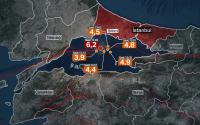18 April 2005
A new Mike Davis piece at Tomdispatch is, to my mind, always cause for rejoicing. If you live in the San Francisco Bay Area -- where I've been hunkering down for the last several weeks -- or New York City, where I live, or at various other familiar urban locations (or their suburbs), you already know that buying an apartment, or a house, has become a kind of living nightmare beyond the means of most people. Take Washington, where, according to the estimates of real-estate agents and builders (as reported in the Washington Post), prices have risen by about 15% since the beginning of this year -- add that to the 21% rise last year and the 89% rise over the last five years, and you may have the American equivalent of Tulipmania. (In 17th century Holland, the craze for tulip bulbs reached such proportions that "the price of one special, rare type of tulip bulb called Semper Augustus was 1000 guilders in 1623, 1200 guilders in 1624, 2000 guilders in 1625, and 5500 guilders in 1637" -- this at a time when average annual income was 150 guilders. And then, of course, the tulip bubble burst…) As Washington Post reporter Daniela Deane puts it of the present housing mania in the Washington area, "It's another insane spring in the local real estate market. As the prime season for buying and selling unfolds, very few homes are for sale, prices are climbing rapidly and desperate would-be buyers are bidding feverishly against each other… But now the question comes up more and more: How long can this last?"
Needless to say, at least some mainline economists are starting to get nervous about whether the housing boom isn't a housing bubble. Mike Davis, on the other hand, asks whether it isn't a housing bomb set to explode right under the Bush administration. As he does on just about any subject he touches, Davis takes our real-estate boom and makes a new kind of news out of it, suggesting that the Bush administration is riding this particular economic tsunami to an uncertain -- but possibly unenviable -- end.
After I return to New York and once again have the time to read the news more fully, I hope to turn to the question of how the Bush administration might indeed implode. In the meantime, in the week after at least one false bottom dropped out of the stock market, read Mike Davis and think about the economic realities of imperial America. Tom
Riotous Real Estate
By Mike DavisLast February the sirens howled in Hollywood as the LAPD rushed reinforcements to the 5600 block of La Mirada Avenue. While a police captain barked orders through a bullhorn, an angry crowd of 3000 people shouted back expletives. A passerby might have mistaken the confrontation for a major movie shoot, or perhaps the beginning of the next great L.A. riot.
In fact, as LAPD Captain Michael Downing later told the press: "You had some very desperate people who had a mob mentality. It was as if people were trying to get the last piece of bread."
The bread-riot allusion was apt, although the crowd was in fact clamoring for the last crumbs of affordable housing in a city where rents and mortgages have been soaring through the stratosphere. At stake were 56 unfinished apartments being built by a non-profit agency. The developers had expected a turnout of, at most, several hundred. When thousands of desperate applicants showed up instead, the scene quickly turned ugly and the police intervened.
A few weekends after this tense confrontation in Hollywood, another anxious mob -- this time composed of more affluent home-seekers -- queued up for hours for an opportunity to make outrageous bids on a single, run-down house with a cracked foundation in a nearby suburb renowned for its good schools. "The teeming crowd," wrote Los Angeles Times columnist Steve Lopez, "was no surprise given the latest evidence that California's public schools are dropout factories."
Los Angeles' under-funded, overcrowded, and violent schools, according to a recent report by Harvard researchers, currently fail to graduate the majority of their Black and Latino students, as well as one-third of whites. Parents, as a result, are willing to make extraordinary sacrifices to move their children to suburbs with functioning public education. This gives the old adage that "location is everything" in real estate a new twist: Housing in Southern California is universally advertised and graded by the prestige of local school districts.
The Southern California housing crisis, of course, has a sunnier side as well. In the last five years median home values have increased 118 per cent in Los Angeles and an extraordinary 137 per cent in neighboring San Diego. Homes, as a result, have become private ATM machines, providing their owners with magical, unearned cash flows for purchasing new sports utility vehicles, making down payments on vacation homes, and financing increasingly expensive college educations for their kids. Second mortgages and home refinancings, according to a Wharton Business School survey, have generated an astounding $1.6 trillion in additional consumption since 2000.
The great American housing bubble, like its obese counterparts in the UK, Ireland, the Netherlands, Spain, and Australia, is a classical zero-sum game. Without generating an atom of new wealth, land inflation ruthlessly redistributes wealth from asset-seekers to asset-holders, reinforcing divisions within as well as between social classes. A young schoolteacher in San Diego who rents an apartment, for example, now faces an annual housing cost ($24,000 for a two-bedroom in a central area) equivalent to two-thirds of her income. Conversely, an older school bus-driver who owns a modest home in the same neighborhood may have "earned" almost as much from housing inflation as from his unionized job.
The current housing bubble is the bastard offspring of the stock-market bubble of the mid-1990s. Housing prices, especially on the West Coast and in the East's Bos-Wash corridor, began to rocket in the second half of 1995 as dot-com profits were ploughed into real estate. The boom has been sustained by sensationally low mortgage rates, thanks principally to the willingness of China to buy vast amounts of U.S. Treasury bonds despite their low or negative yields. Beijing has been willing to subsidize American mortgage borrowers as the price for keeping the door open to Chinese exports.
Similarly, the hottest home markets -- Southern California, Las Vegas, New York, Miami, and Washington, D.C. -- have attracted voracious ant columns of pure speculators, buying and selling homes in the gamble that prices will continue to rise. The most successful speculator, of course, has been George W. Bush. Rising home values have propped up a stagnant economy and blunted criticisms of otherwise disastrous economic policies.
The Democrats for their part have failed to address seriously the crisis of millions of families now locked out of home-ownership. In a bubble city like San Diego, for instance, less than 15% of the population earns enough to finance the cost of a median-value new home.
Accordingly, if "values" were the basis for the Bush victory last November, they were property values not moral principles or religious prejudices. In the face of the perverse housing bubble, the Kerry campaign, as with healthcare costs and the export of jobs, was simply running on empty. It offered no compelling alternative to the status quo. But the Republicans have more serious things to worry about than Democrats. As the real-estate bubble reaches its peak, George Bush may discover that he has been surfing a tsunami and that a towering cliff looms ahead.
The bubble has already burst in San Francisco, and the April 11th issue of Business Week headlined fears that a general deflation – perhaps of international magnitude – is nigh. What will life be like in the United States (or Britain or Ireland) after the home-equity ATM shuts down?
The business press, as always, reassures passengers that they are headed for a "soft landing," a slowdown rather than a crash, but even a mild jolt may be sufficient to end the current anemic recovery and throw all the dollar-pegged economies into recession. More ominously, some eminently respectable Wall Street economists, like Stephen Roach of Morgan Stanley, have been warning of a dangerous negative-feedback loop between the foreign-subsidized housing bubble and the huge U.S. trade and budget deficits. ("The funding of America," he has written, "is an accident waiting to happen.")
At the end of the day, American military hegemony is no longer underwritten by an equivalent global economic supremacy. The housing bubble, like the dot-com boom before it, has temporarily masked a mess of economic contradictions. As a result, the second term of George W. Bush may hold some first-class Shakespearian surprises.
Mike Davis is the author of Dead Cities and the forthcoming Monster at the Door: the Global Threat of Avian Influenza (New Press 2005).






